Drivers and Challenges of Globalisation and Strategic Direction Report
VerifiedAdded on 2023/01/17
|16
|4345
|58
Report
AI Summary
This report provides a comprehensive analysis of the global business environment, focusing on the drivers and challenges of globalisation and their impact on strategic direction. The report examines the business environment, including political, economic, social, technological, environmental, and legal factors (PESTLE analysis), with a specific focus on the context of SASOL Ltd. and its potential expansion into the Chinese market. It explores the structure, culture, and governance of organisations, as well as ethical and sustainable factors in a global market. Furthermore, it applies Hofstede's Cultural Dimensions to evaluate the influences of globalisation on the international organisation and discusses effective decision-making in a global context. The report also identifies various routes to internationalisation and key barriers, offering recommendations for overcoming challenges. The report is divided into two parts, including a PPT presentation, providing a detailed overview of the subject matter.
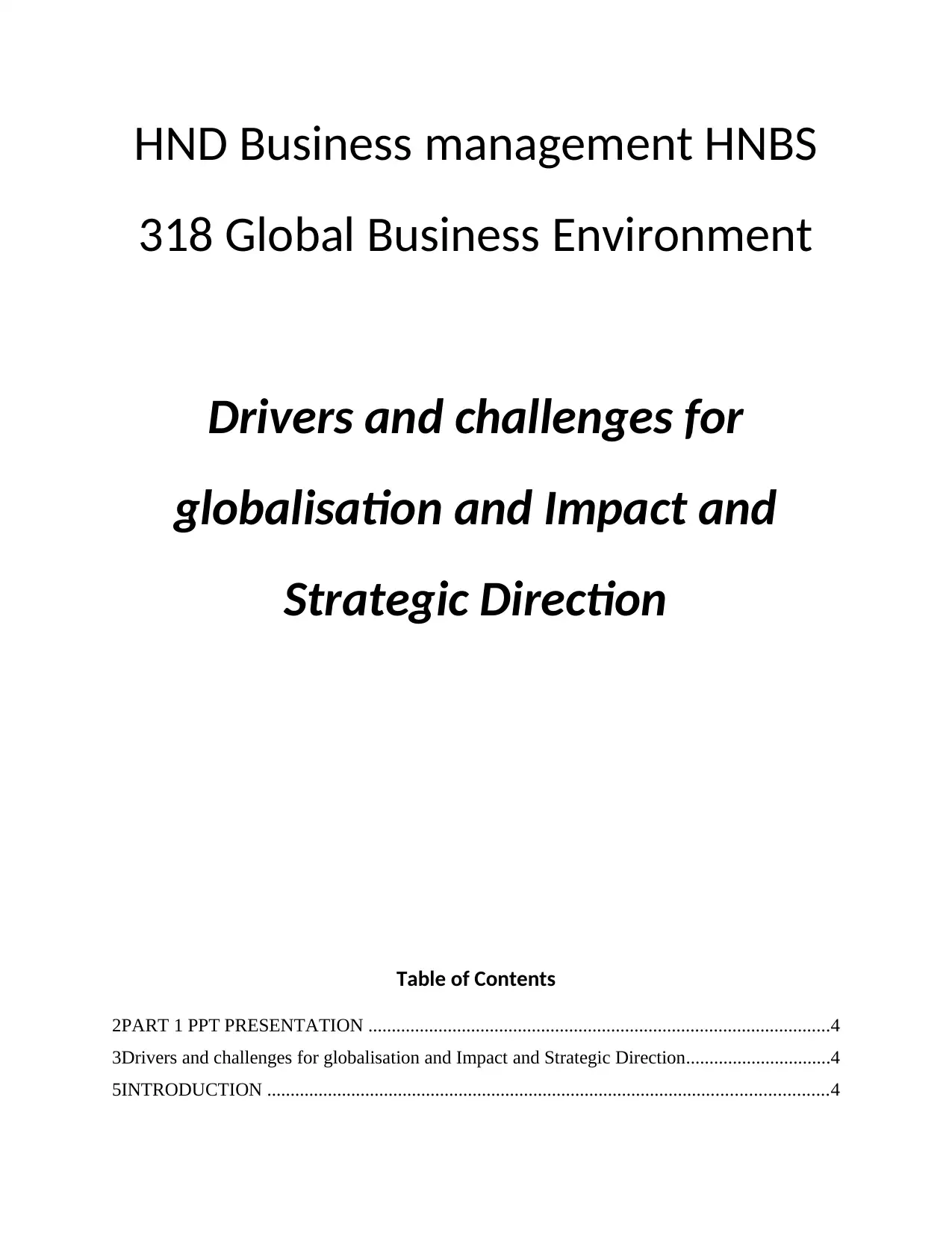
HND Business management HNBS
318 Global Business Environment
Drivers and challenges for
globalisation and Impact and
Strategic Direction
Table of Contents
2PART 1 PPT PRESENTATION ...................................................................................................4
3Drivers and challenges for globalisation and Impact and Strategic Direction...............................4
5INTRODUCTION ........................................................................................................................4
318 Global Business Environment
Drivers and challenges for
globalisation and Impact and
Strategic Direction
Table of Contents
2PART 1 PPT PRESENTATION ...................................................................................................4
3Drivers and challenges for globalisation and Impact and Strategic Direction...............................4
5INTRODUCTION ........................................................................................................................4
Paraphrase This Document
Need a fresh take? Get an instant paraphrase of this document with our AI Paraphraser
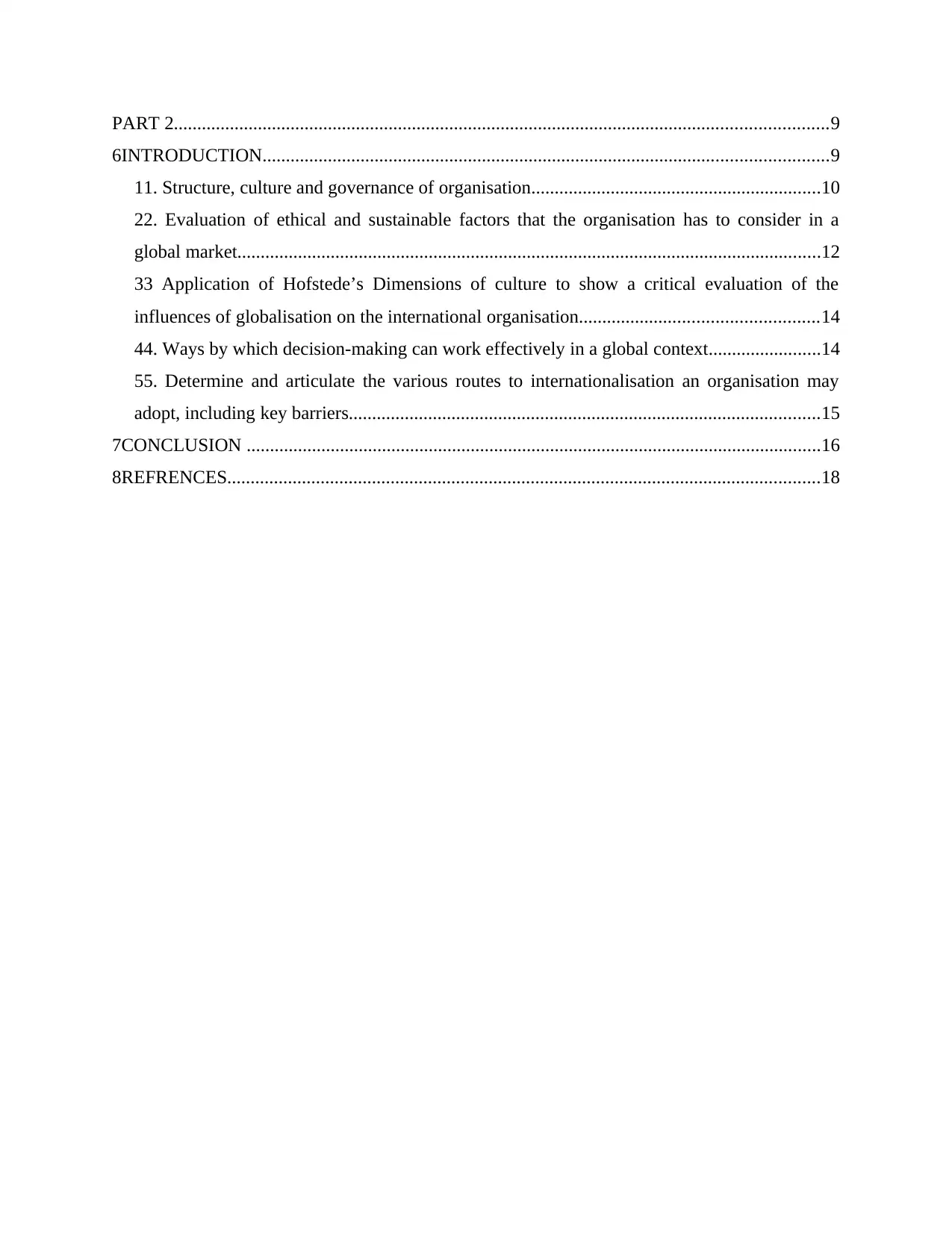
PART 2............................................................................................................................................9
6INTRODUCTION.........................................................................................................................9
11. Structure, culture and governance of organisation..............................................................10
22. Evaluation of ethical and sustainable factors that the organisation has to consider in a
global market.............................................................................................................................12
33 Application of Hofstede’s Dimensions of culture to show a critical evaluation of the
influences of globalisation on the international organisation...................................................14
44. Ways by which decision-making can work effectively in a global context........................14
55. Determine and articulate the various routes to internationalisation an organisation may
adopt, including key barriers.....................................................................................................15
7CONCLUSION ...........................................................................................................................16
8REFRENCES...............................................................................................................................18
6INTRODUCTION.........................................................................................................................9
11. Structure, culture and governance of organisation..............................................................10
22. Evaluation of ethical and sustainable factors that the organisation has to consider in a
global market.............................................................................................................................12
33 Application of Hofstede’s Dimensions of culture to show a critical evaluation of the
influences of globalisation on the international organisation...................................................14
44. Ways by which decision-making can work effectively in a global context........................14
55. Determine and articulate the various routes to internationalisation an organisation may
adopt, including key barriers.....................................................................................................15
7CONCLUSION ...........................................................................................................................16
8REFRENCES...............................................................................................................................18
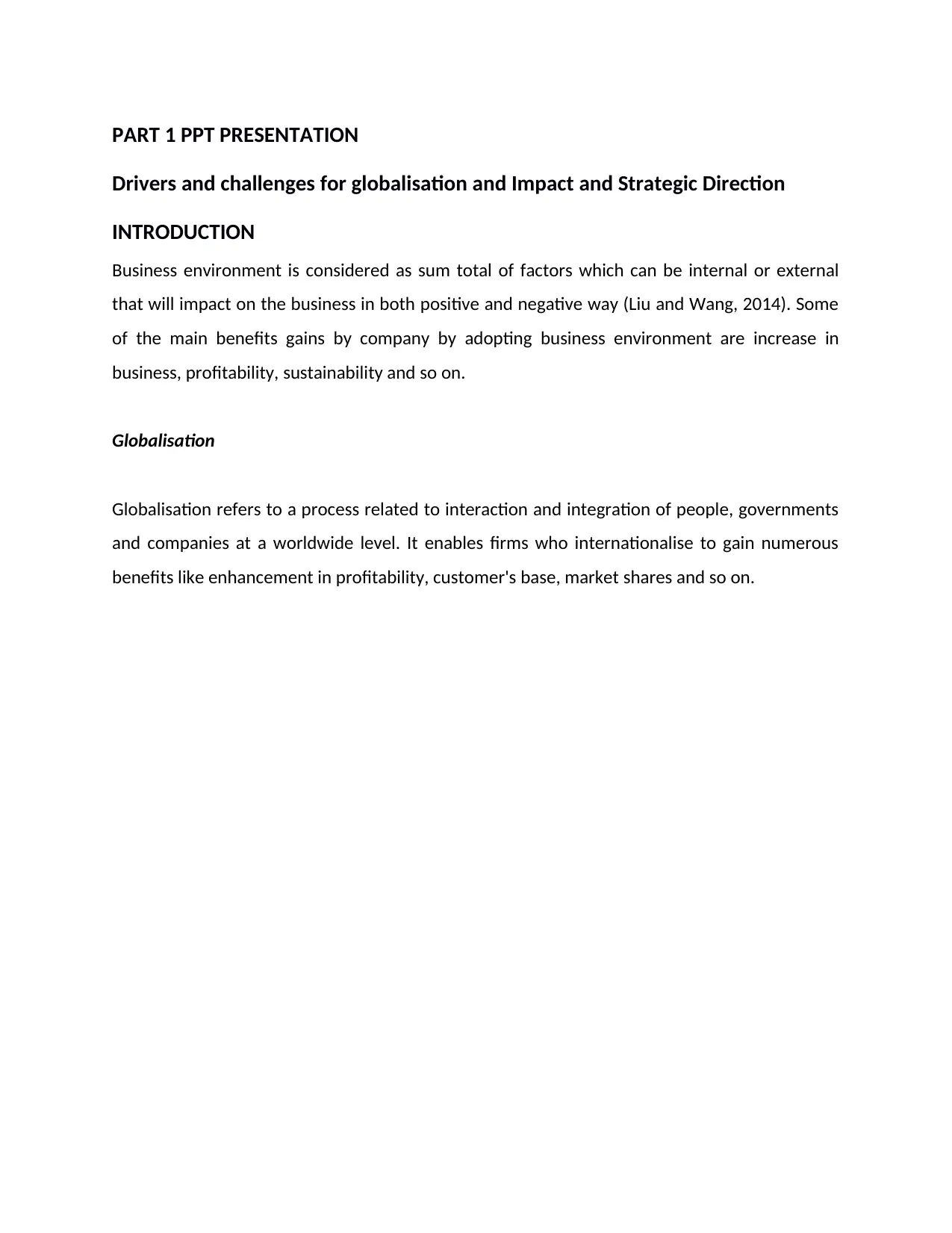
PART 1 PPT PRESENTATION
Drivers and challenges for globalisation and Impact and Strategic Direction
INTRODUCTION
Business environment is considered as sum total of factors which can be internal or external
that will impact on the business in both positive and negative way (Liu and Wang, 2014). Some
of the main benefits gains by company by adopting business environment are increase in
business, profitability, sustainability and so on.
Globalisation
Globalisation refers to a process related to interaction and integration of people, governments
and companies at a worldwide level. It enables firms who internationalise to gain numerous
benefits like enhancement in profitability, customer's base, market shares and so on.
Drivers and challenges for globalisation and Impact and Strategic Direction
INTRODUCTION
Business environment is considered as sum total of factors which can be internal or external
that will impact on the business in both positive and negative way (Liu and Wang, 2014). Some
of the main benefits gains by company by adopting business environment are increase in
business, profitability, sustainability and so on.
Globalisation
Globalisation refers to a process related to interaction and integration of people, governments
and companies at a worldwide level. It enables firms who internationalise to gain numerous
benefits like enhancement in profitability, customer's base, market shares and so on.
⊘ This is a preview!⊘
Do you want full access?
Subscribe today to unlock all pages.

Trusted by 1+ million students worldwide
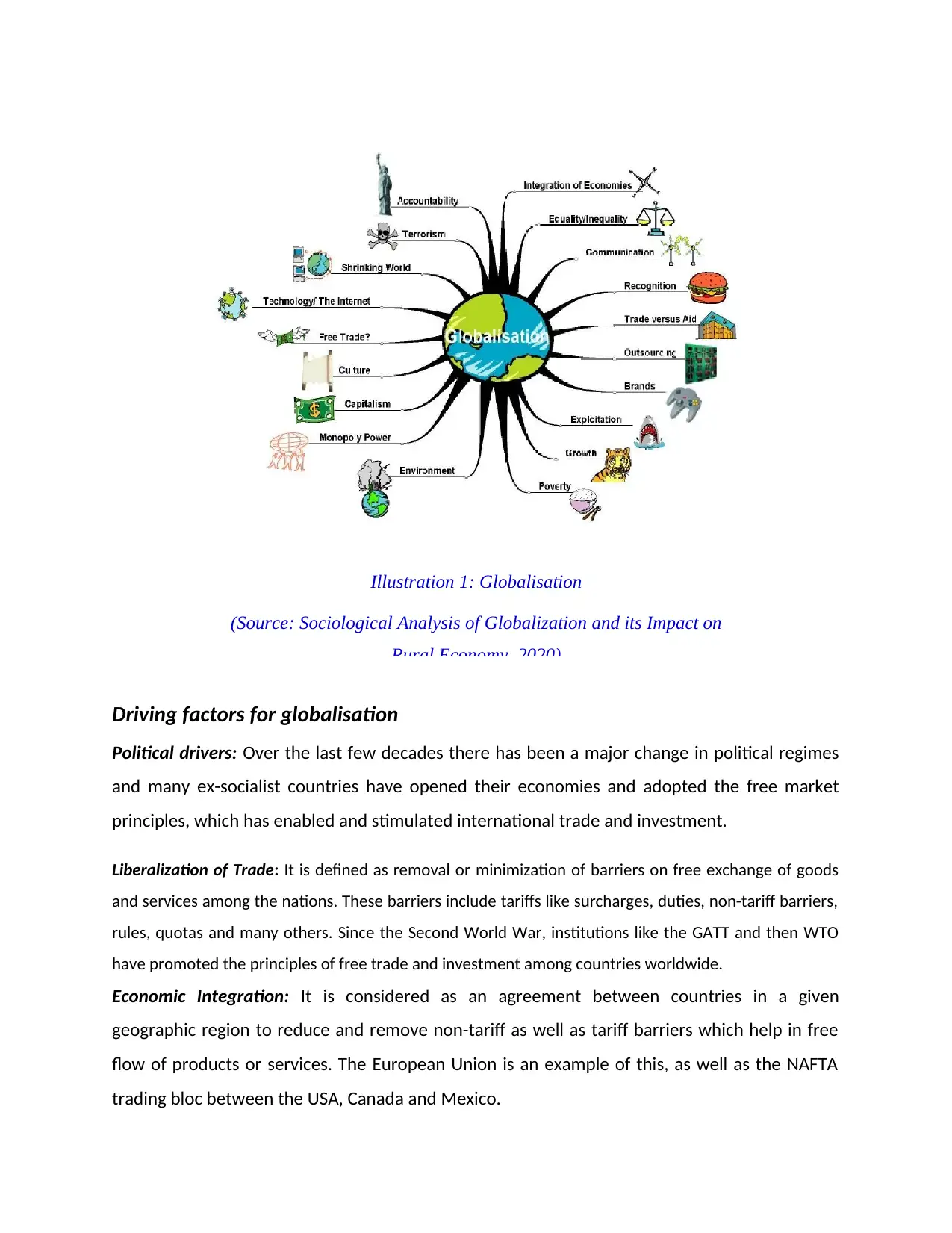
Illustration 1: Globalisation
(Source: Sociological Analysis of Globalization and its Impact on
Rural Economy, 2020)
Driving factors for globalisation
Political drivers: Over the last few decades there has been a major change in political regimes
and many ex-socialist countries have opened their economies and adopted the free market
principles, which has enabled and stimulated international trade and investment.
Liberalization of Trade: It is defined as removal or minimization of barriers on free exchange of goods
and services among the nations. These barriers include tariffs like surcharges, duties, non-tariff barriers,
rules, quotas and many others. Since the Second World War, institutions like the GATT and then WTO
have promoted the principles of free trade and investment among countries worldwide.
Economic Integration: It is considered as an agreement between countries in a given
geographic region to reduce and remove non-tariff as well as tariff barriers which help in free
flow of products or services. The European Union is an example of this, as well as the NAFTA
trading bloc between the USA, Canada and Mexico.
(Source: Sociological Analysis of Globalization and its Impact on
Rural Economy, 2020)
Driving factors for globalisation
Political drivers: Over the last few decades there has been a major change in political regimes
and many ex-socialist countries have opened their economies and adopted the free market
principles, which has enabled and stimulated international trade and investment.
Liberalization of Trade: It is defined as removal or minimization of barriers on free exchange of goods
and services among the nations. These barriers include tariffs like surcharges, duties, non-tariff barriers,
rules, quotas and many others. Since the Second World War, institutions like the GATT and then WTO
have promoted the principles of free trade and investment among countries worldwide.
Economic Integration: It is considered as an agreement between countries in a given
geographic region to reduce and remove non-tariff as well as tariff barriers which help in free
flow of products or services. The European Union is an example of this, as well as the NAFTA
trading bloc between the USA, Canada and Mexico.
Paraphrase This Document
Need a fresh take? Get an instant paraphrase of this document with our AI Paraphraser
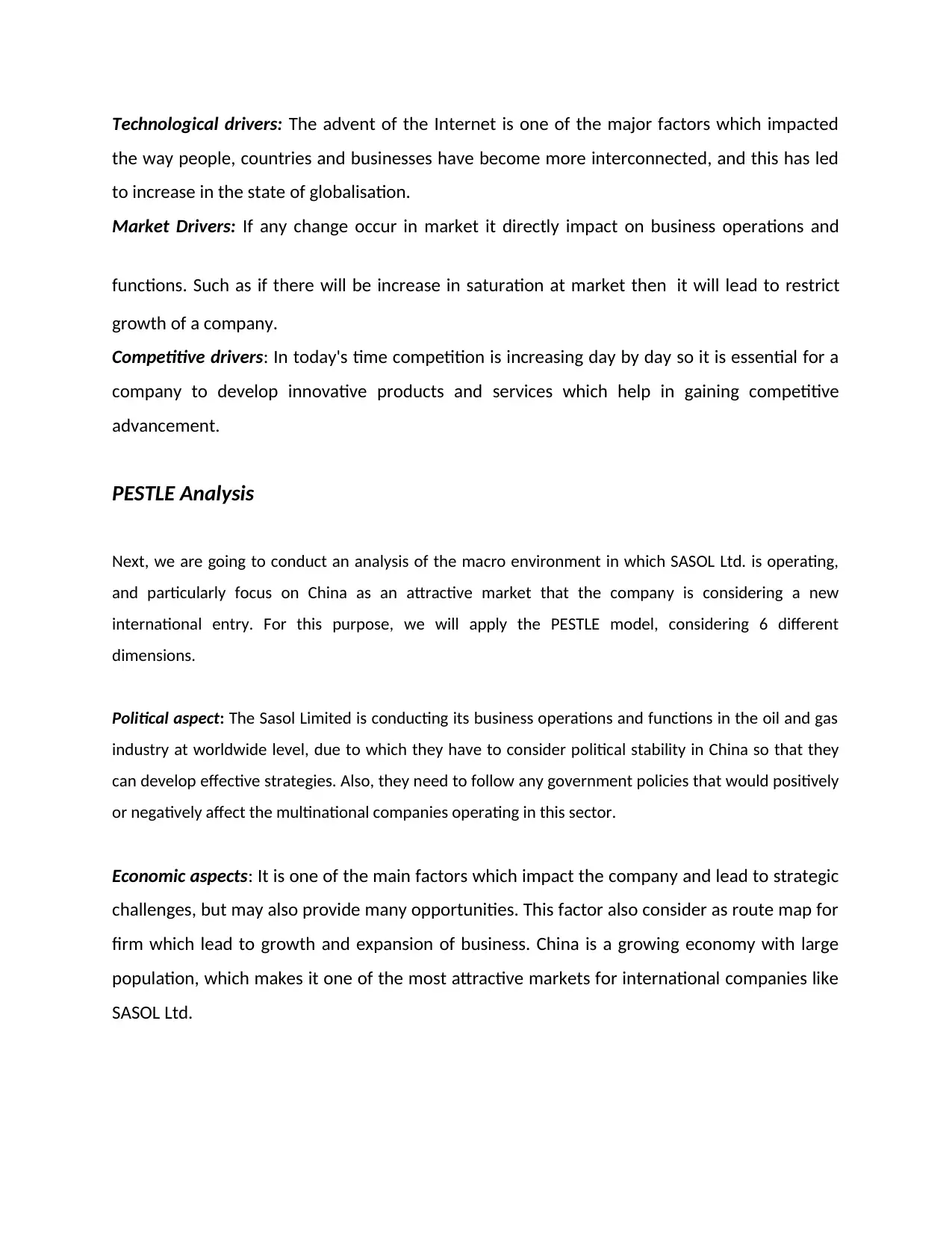
Technological drivers: The advent of the Internet is one of the major factors which impacted
the way people, countries and businesses have become more interconnected, and this has led
to increase in the state of globalisation.
Market Drivers: If any change occur in market it directly impact on business operations and
functions. Such as if there will be increase in saturation at market then it will lead to restrict
growth of a company.
Competitive drivers: In today's time competition is increasing day by day so it is essential for a
company to develop innovative products and services which help in gaining competitive
advancement.
PESTLE Analysis
Next, we are going to conduct an analysis of the macro environment in which SASOL Ltd. is operating,
and particularly focus on China as an attractive market that the company is considering a new
international entry. For this purpose, we will apply the PESTLE model, considering 6 different
dimensions.
Political aspect: The Sasol Limited is conducting its business operations and functions in the oil and gas
industry at worldwide level, due to which they have to consider political stability in China so that they
can develop effective strategies. Also, they need to follow any government policies that would positively
or negatively affect the multinational companies operating in this sector.
Economic aspects: It is one of the main factors which impact the company and lead to strategic
challenges, but may also provide many opportunities. This factor also consider as route map for
firm which lead to growth and expansion of business. China is a growing economy with large
population, which makes it one of the most attractive markets for international companies like
SASOL Ltd.
the way people, countries and businesses have become more interconnected, and this has led
to increase in the state of globalisation.
Market Drivers: If any change occur in market it directly impact on business operations and
functions. Such as if there will be increase in saturation at market then it will lead to restrict
growth of a company.
Competitive drivers: In today's time competition is increasing day by day so it is essential for a
company to develop innovative products and services which help in gaining competitive
advancement.
PESTLE Analysis
Next, we are going to conduct an analysis of the macro environment in which SASOL Ltd. is operating,
and particularly focus on China as an attractive market that the company is considering a new
international entry. For this purpose, we will apply the PESTLE model, considering 6 different
dimensions.
Political aspect: The Sasol Limited is conducting its business operations and functions in the oil and gas
industry at worldwide level, due to which they have to consider political stability in China so that they
can develop effective strategies. Also, they need to follow any government policies that would positively
or negatively affect the multinational companies operating in this sector.
Economic aspects: It is one of the main factors which impact the company and lead to strategic
challenges, but may also provide many opportunities. This factor also consider as route map for
firm which lead to growth and expansion of business. China is a growing economy with large
population, which makes it one of the most attractive markets for international companies like
SASOL Ltd.
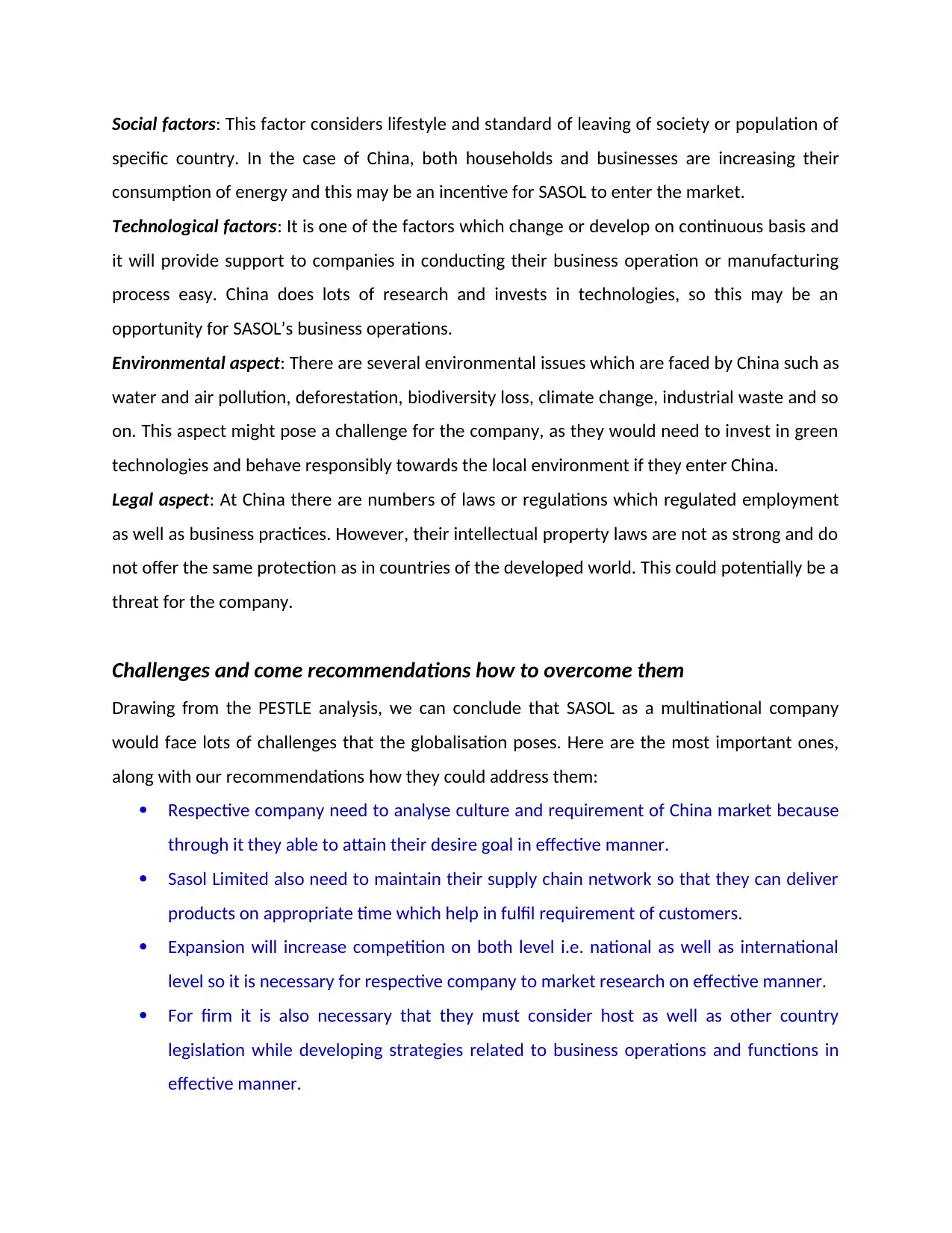
Social factors: This factor considers lifestyle and standard of leaving of society or population of
specific country. In the case of China, both households and businesses are increasing their
consumption of energy and this may be an incentive for SASOL to enter the market.
Technological factors: It is one of the factors which change or develop on continuous basis and
it will provide support to companies in conducting their business operation or manufacturing
process easy. China does lots of research and invests in technologies, so this may be an
opportunity for SASOL’s business operations.
Environmental aspect: There are several environmental issues which are faced by China such as
water and air pollution, deforestation, biodiversity loss, climate change, industrial waste and so
on. This aspect might pose a challenge for the company, as they would need to invest in green
technologies and behave responsibly towards the local environment if they enter China.
Legal aspect: At China there are numbers of laws or regulations which regulated employment
as well as business practices. However, their intellectual property laws are not as strong and do
not offer the same protection as in countries of the developed world. This could potentially be a
threat for the company.
Challenges and come recommendations how to overcome them
Drawing from the PESTLE analysis, we can conclude that SASOL as a multinational company
would face lots of challenges that the globalisation poses. Here are the most important ones,
along with our recommendations how they could address them:
Respective company need to analyse culture and requirement of China market because
through it they able to attain their desire goal in effective manner.
Sasol Limited also need to maintain their supply chain network so that they can deliver
products on appropriate time which help in fulfil requirement of customers.
Expansion will increase competition on both level i.e. national as well as international
level so it is necessary for respective company to market research on effective manner.
For firm it is also necessary that they must consider host as well as other country
legislation while developing strategies related to business operations and functions in
effective manner.
specific country. In the case of China, both households and businesses are increasing their
consumption of energy and this may be an incentive for SASOL to enter the market.
Technological factors: It is one of the factors which change or develop on continuous basis and
it will provide support to companies in conducting their business operation or manufacturing
process easy. China does lots of research and invests in technologies, so this may be an
opportunity for SASOL’s business operations.
Environmental aspect: There are several environmental issues which are faced by China such as
water and air pollution, deforestation, biodiversity loss, climate change, industrial waste and so
on. This aspect might pose a challenge for the company, as they would need to invest in green
technologies and behave responsibly towards the local environment if they enter China.
Legal aspect: At China there are numbers of laws or regulations which regulated employment
as well as business practices. However, their intellectual property laws are not as strong and do
not offer the same protection as in countries of the developed world. This could potentially be a
threat for the company.
Challenges and come recommendations how to overcome them
Drawing from the PESTLE analysis, we can conclude that SASOL as a multinational company
would face lots of challenges that the globalisation poses. Here are the most important ones,
along with our recommendations how they could address them:
Respective company need to analyse culture and requirement of China market because
through it they able to attain their desire goal in effective manner.
Sasol Limited also need to maintain their supply chain network so that they can deliver
products on appropriate time which help in fulfil requirement of customers.
Expansion will increase competition on both level i.e. national as well as international
level so it is necessary for respective company to market research on effective manner.
For firm it is also necessary that they must consider host as well as other country
legislation while developing strategies related to business operations and functions in
effective manner.
⊘ This is a preview!⊘
Do you want full access?
Subscribe today to unlock all pages.

Trusted by 1+ million students worldwide
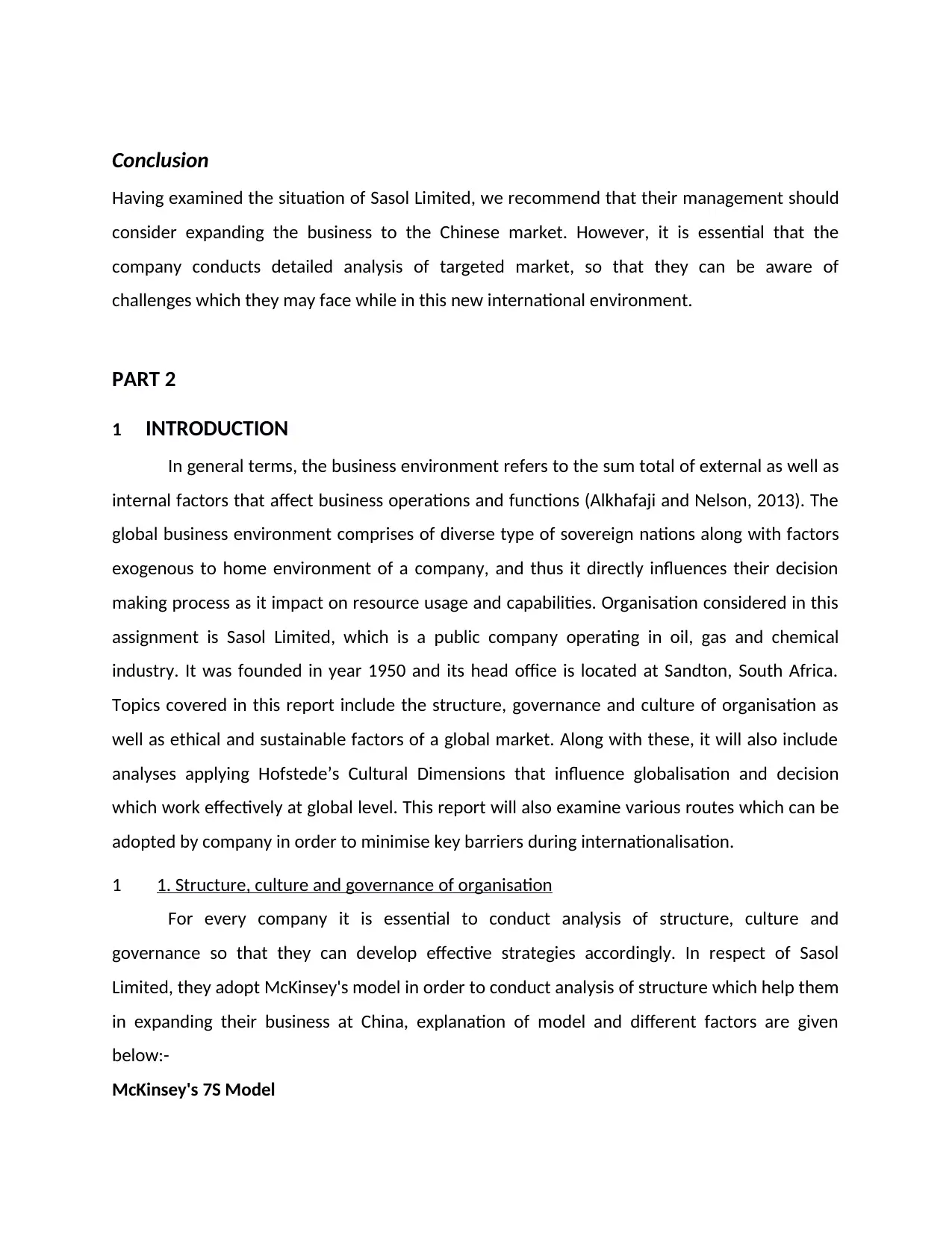
Conclusion
Having examined the situation of Sasol Limited, we recommend that their management should
consider expanding the business to the Chinese market. However, it is essential that the
company conducts detailed analysis of targeted market, so that they can be aware of
challenges which they may face while in this new international environment.
PART 2
1 INTRODUCTION
In general terms, the business environment refers to the sum total of external as well as
internal factors that affect business operations and functions (Alkhafaji and Nelson, 2013). The
global business environment comprises of diverse type of sovereign nations along with factors
exogenous to home environment of a company, and thus it directly influences their decision
making process as it impact on resource usage and capabilities. Organisation considered in this
assignment is Sasol Limited, which is a public company operating in oil, gas and chemical
industry. It was founded in year 1950 and its head office is located at Sandton, South Africa.
Topics covered in this report include the structure, governance and culture of organisation as
well as ethical and sustainable factors of a global market. Along with these, it will also include
analyses applying Hofstede’s Cultural Dimensions that influence globalisation and decision
which work effectively at global level. This report will also examine various routes which can be
adopted by company in order to minimise key barriers during internationalisation.
1 1. Structure, culture and governance of organisation
For every company it is essential to conduct analysis of structure, culture and
governance so that they can develop effective strategies accordingly. In respect of Sasol
Limited, they adopt McKinsey's model in order to conduct analysis of structure which help them
in expanding their business at China, explanation of model and different factors are given
below:-
McKinsey's 7S Model
Having examined the situation of Sasol Limited, we recommend that their management should
consider expanding the business to the Chinese market. However, it is essential that the
company conducts detailed analysis of targeted market, so that they can be aware of
challenges which they may face while in this new international environment.
PART 2
1 INTRODUCTION
In general terms, the business environment refers to the sum total of external as well as
internal factors that affect business operations and functions (Alkhafaji and Nelson, 2013). The
global business environment comprises of diverse type of sovereign nations along with factors
exogenous to home environment of a company, and thus it directly influences their decision
making process as it impact on resource usage and capabilities. Organisation considered in this
assignment is Sasol Limited, which is a public company operating in oil, gas and chemical
industry. It was founded in year 1950 and its head office is located at Sandton, South Africa.
Topics covered in this report include the structure, governance and culture of organisation as
well as ethical and sustainable factors of a global market. Along with these, it will also include
analyses applying Hofstede’s Cultural Dimensions that influence globalisation and decision
which work effectively at global level. This report will also examine various routes which can be
adopted by company in order to minimise key barriers during internationalisation.
1 1. Structure, culture and governance of organisation
For every company it is essential to conduct analysis of structure, culture and
governance so that they can develop effective strategies accordingly. In respect of Sasol
Limited, they adopt McKinsey's model in order to conduct analysis of structure which help them
in expanding their business at China, explanation of model and different factors are given
below:-
McKinsey's 7S Model
Paraphrase This Document
Need a fresh take? Get an instant paraphrase of this document with our AI Paraphraser
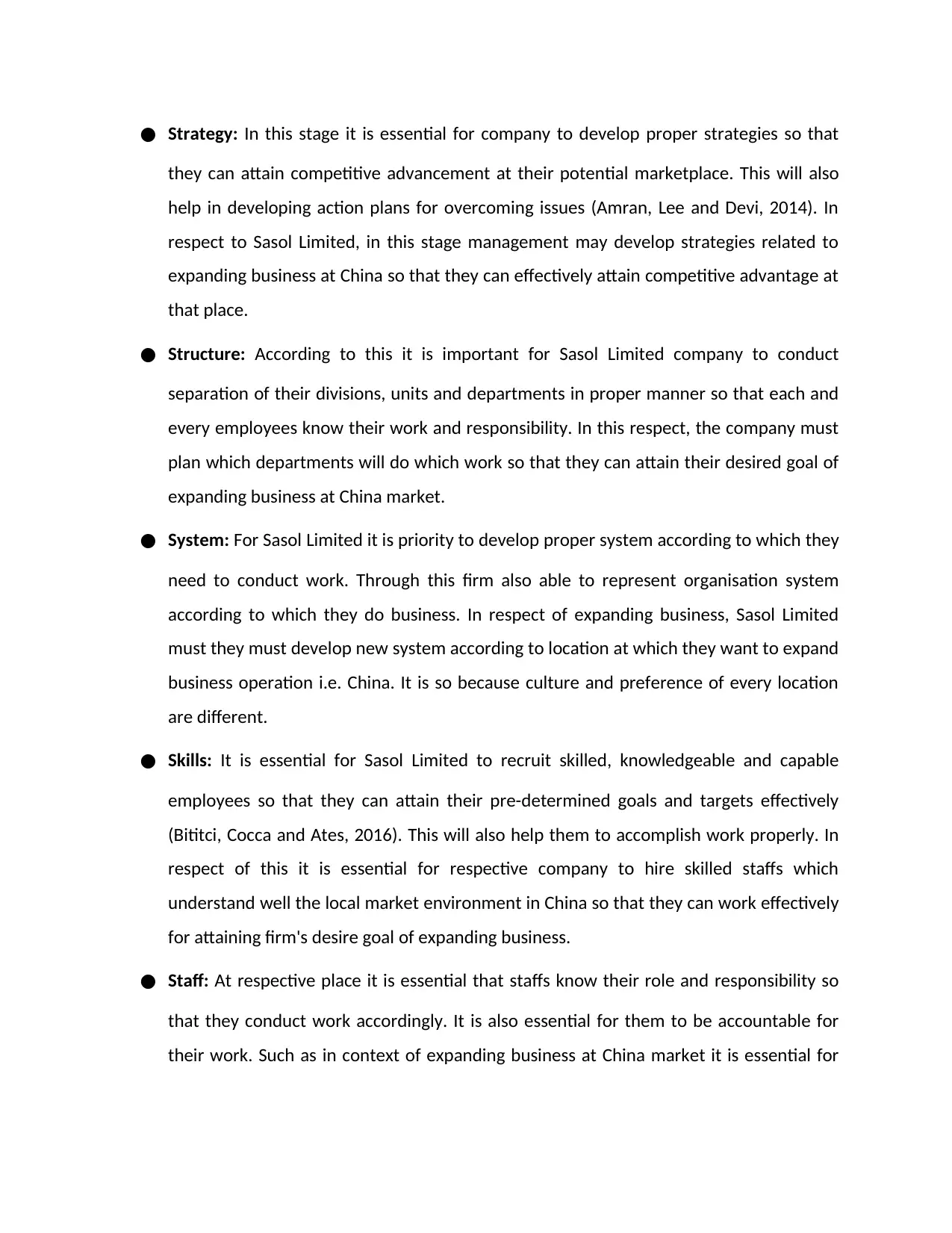
● Strategy: In this stage it is essential for company to develop proper strategies so that
they can attain competitive advancement at their potential marketplace. This will also
help in developing action plans for overcoming issues (Amran, Lee and Devi, 2014). In
respect to Sasol Limited, in this stage management may develop strategies related to
expanding business at China so that they can effectively attain competitive advantage at
that place.
● Structure: According to this it is important for Sasol Limited company to conduct
separation of their divisions, units and departments in proper manner so that each and
every employees know their work and responsibility. In this respect, the company must
plan which departments will do which work so that they can attain their desired goal of
expanding business at China market.
● System: For Sasol Limited it is priority to develop proper system according to which they
need to conduct work. Through this firm also able to represent organisation system
according to which they do business. In respect of expanding business, Sasol Limited
must they must develop new system according to location at which they want to expand
business operation i.e. China. It is so because culture and preference of every location
are different.
● Skills: It is essential for Sasol Limited to recruit skilled, knowledgeable and capable
employees so that they can attain their pre-determined goals and targets effectively
(Bititci, Cocca and Ates, 2016). This will also help them to accomplish work properly. In
respect of this it is essential for respective company to hire skilled staffs which
understand well the local market environment in China so that they can work effectively
for attaining firm's desire goal of expanding business.
● Staff: At respective place it is essential that staffs know their role and responsibility so
that they conduct work accordingly. It is also essential for them to be accountable for
their work. Such as in context of expanding business at China market it is essential for
they can attain competitive advancement at their potential marketplace. This will also
help in developing action plans for overcoming issues (Amran, Lee and Devi, 2014). In
respect to Sasol Limited, in this stage management may develop strategies related to
expanding business at China so that they can effectively attain competitive advantage at
that place.
● Structure: According to this it is important for Sasol Limited company to conduct
separation of their divisions, units and departments in proper manner so that each and
every employees know their work and responsibility. In this respect, the company must
plan which departments will do which work so that they can attain their desired goal of
expanding business at China market.
● System: For Sasol Limited it is priority to develop proper system according to which they
need to conduct work. Through this firm also able to represent organisation system
according to which they do business. In respect of expanding business, Sasol Limited
must they must develop new system according to location at which they want to expand
business operation i.e. China. It is so because culture and preference of every location
are different.
● Skills: It is essential for Sasol Limited to recruit skilled, knowledgeable and capable
employees so that they can attain their pre-determined goals and targets effectively
(Bititci, Cocca and Ates, 2016). This will also help them to accomplish work properly. In
respect of this it is essential for respective company to hire skilled staffs which
understand well the local market environment in China so that they can work effectively
for attaining firm's desire goal of expanding business.
● Staff: At respective place it is essential that staffs know their role and responsibility so
that they conduct work accordingly. It is also essential for them to be accountable for
their work. Such as in context of expanding business at China market it is essential for
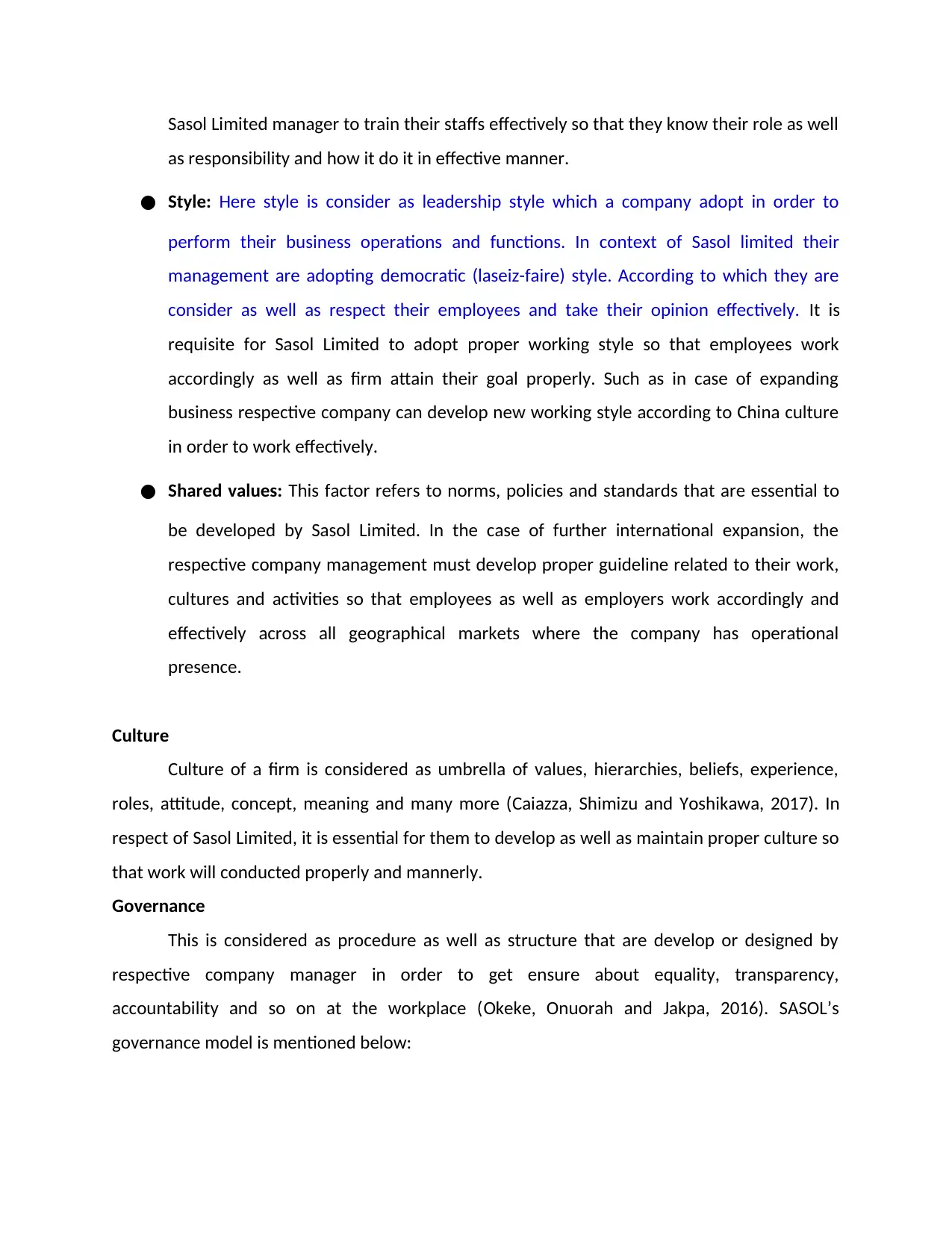
Sasol Limited manager to train their staffs effectively so that they know their role as well
as responsibility and how it do it in effective manner.
● Style: Here style is consider as leadership style which a company adopt in order to
perform their business operations and functions. In context of Sasol limited their
management are adopting democratic (laseiz-faire) style. According to which they are
consider as well as respect their employees and take their opinion effectively. It is
requisite for Sasol Limited to adopt proper working style so that employees work
accordingly as well as firm attain their goal properly. Such as in case of expanding
business respective company can develop new working style according to China culture
in order to work effectively.
● Shared values: This factor refers to norms, policies and standards that are essential to
be developed by Sasol Limited. In the case of further international expansion, the
respective company management must develop proper guideline related to their work,
cultures and activities so that employees as well as employers work accordingly and
effectively across all geographical markets where the company has operational
presence.
Culture
Culture of a firm is considered as umbrella of values, hierarchies, beliefs, experience,
roles, attitude, concept, meaning and many more (Caiazza, Shimizu and Yoshikawa, 2017). In
respect of Sasol Limited, it is essential for them to develop as well as maintain proper culture so
that work will conducted properly and mannerly.
Governance
This is considered as procedure as well as structure that are develop or designed by
respective company manager in order to get ensure about equality, transparency,
accountability and so on at the workplace (Okeke, Onuorah and Jakpa, 2016). SASOL’s
governance model is mentioned below:
as responsibility and how it do it in effective manner.
● Style: Here style is consider as leadership style which a company adopt in order to
perform their business operations and functions. In context of Sasol limited their
management are adopting democratic (laseiz-faire) style. According to which they are
consider as well as respect their employees and take their opinion effectively. It is
requisite for Sasol Limited to adopt proper working style so that employees work
accordingly as well as firm attain their goal properly. Such as in case of expanding
business respective company can develop new working style according to China culture
in order to work effectively.
● Shared values: This factor refers to norms, policies and standards that are essential to
be developed by Sasol Limited. In the case of further international expansion, the
respective company management must develop proper guideline related to their work,
cultures and activities so that employees as well as employers work accordingly and
effectively across all geographical markets where the company has operational
presence.
Culture
Culture of a firm is considered as umbrella of values, hierarchies, beliefs, experience,
roles, attitude, concept, meaning and many more (Caiazza, Shimizu and Yoshikawa, 2017). In
respect of Sasol Limited, it is essential for them to develop as well as maintain proper culture so
that work will conducted properly and mannerly.
Governance
This is considered as procedure as well as structure that are develop or designed by
respective company manager in order to get ensure about equality, transparency,
accountability and so on at the workplace (Okeke, Onuorah and Jakpa, 2016). SASOL’s
governance model is mentioned below:
⊘ This is a preview!⊘
Do you want full access?
Subscribe today to unlock all pages.

Trusted by 1+ million students worldwide
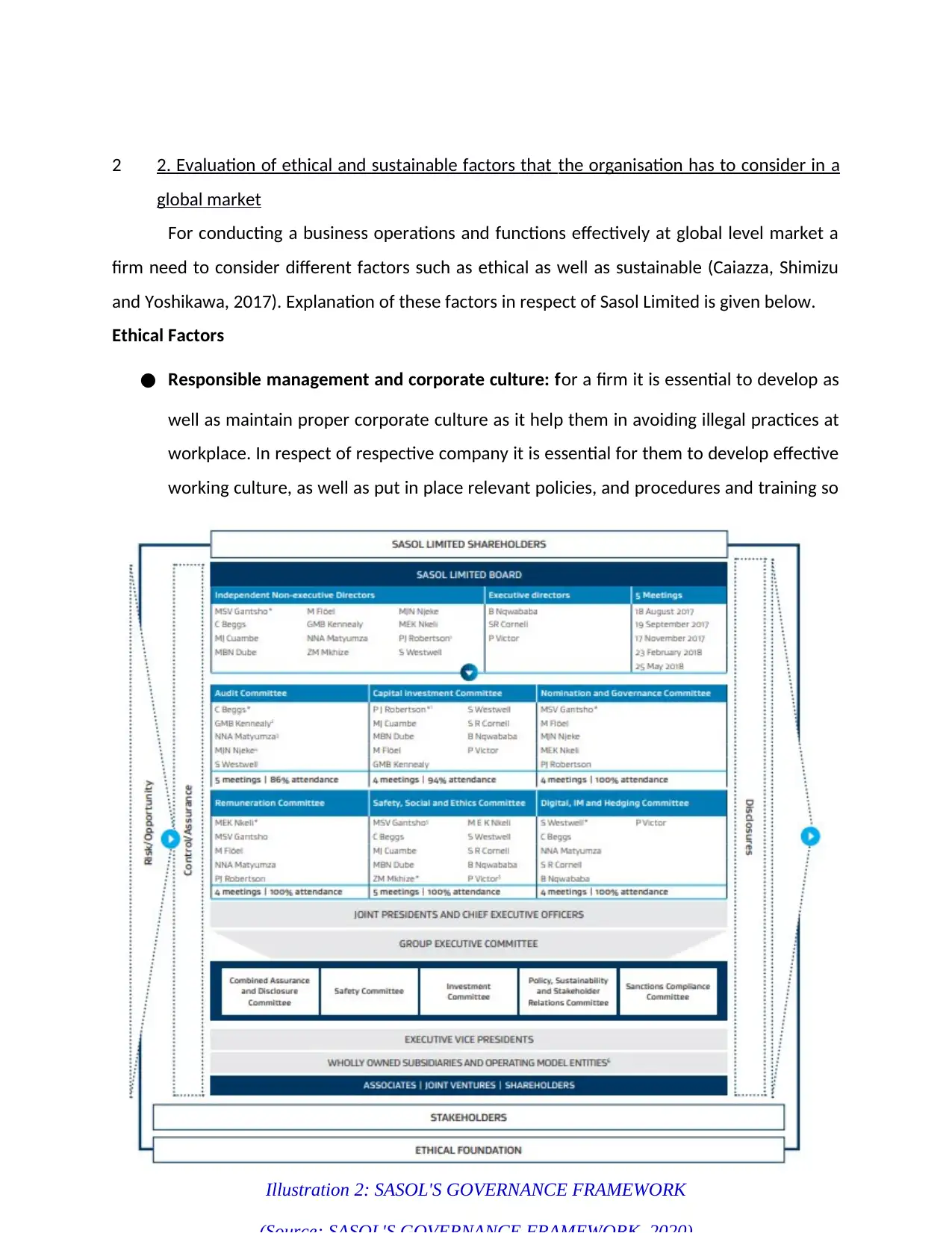
2 2. Evaluation of ethical and sustainable factors that the organisation has to consider in a
global market
For conducting a business operations and functions effectively at global level market a
firm need to consider different factors such as ethical as well as sustainable (Caiazza, Shimizu
and Yoshikawa, 2017). Explanation of these factors in respect of Sasol Limited is given below.
Ethical Factors
● Responsible management and corporate culture: for a firm it is essential to develop as
well as maintain proper corporate culture as it help them in avoiding illegal practices at
workplace. In respect of respective company it is essential for them to develop effective
working culture, as well as put in place relevant policies, and procedures and training so
Illustration 2: SASOL'S GOVERNANCE FRAMEWORK
global market
For conducting a business operations and functions effectively at global level market a
firm need to consider different factors such as ethical as well as sustainable (Caiazza, Shimizu
and Yoshikawa, 2017). Explanation of these factors in respect of Sasol Limited is given below.
Ethical Factors
● Responsible management and corporate culture: for a firm it is essential to develop as
well as maintain proper corporate culture as it help them in avoiding illegal practices at
workplace. In respect of respective company it is essential for them to develop effective
working culture, as well as put in place relevant policies, and procedures and training so
Illustration 2: SASOL'S GOVERNANCE FRAMEWORK
Paraphrase This Document
Need a fresh take? Get an instant paraphrase of this document with our AI Paraphraser
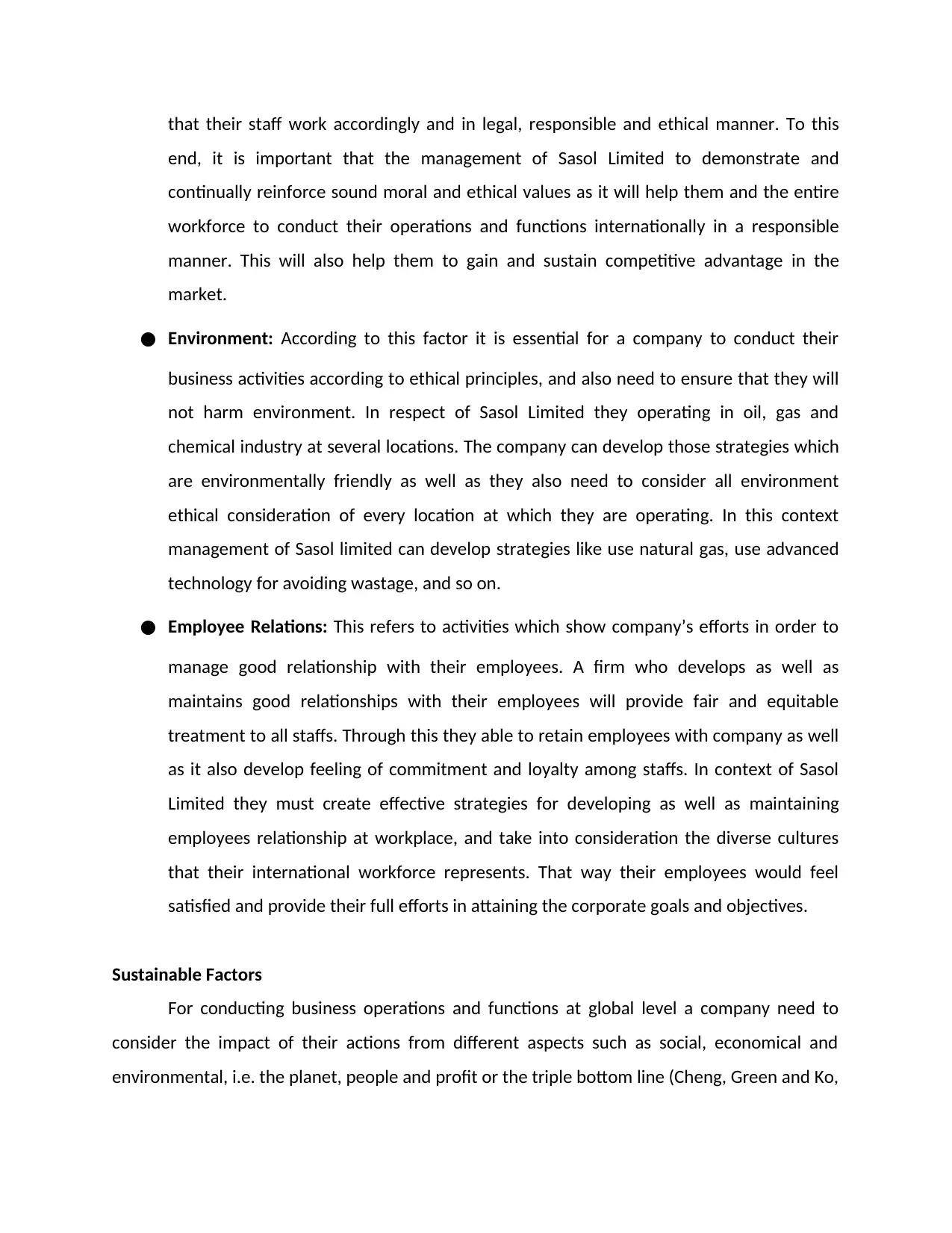
that their staff work accordingly and in legal, responsible and ethical manner. To this
end, it is important that the management of Sasol Limited to demonstrate and
continually reinforce sound moral and ethical values as it will help them and the entire
workforce to conduct their operations and functions internationally in a responsible
manner. This will also help them to gain and sustain competitive advantage in the
market.
● Environment: According to this factor it is essential for a company to conduct their
business activities according to ethical principles, and also need to ensure that they will
not harm environment. In respect of Sasol Limited they operating in oil, gas and
chemical industry at several locations. The company can develop those strategies which
are environmentally friendly as well as they also need to consider all environment
ethical consideration of every location at which they are operating. In this context
management of Sasol limited can develop strategies like use natural gas, use advanced
technology for avoiding wastage, and so on.
● Employee Relations: This refers to activities which show company’s efforts in order to
manage good relationship with their employees. A firm who develops as well as
maintains good relationships with their employees will provide fair and equitable
treatment to all staffs. Through this they able to retain employees with company as well
as it also develop feeling of commitment and loyalty among staffs. In context of Sasol
Limited they must create effective strategies for developing as well as maintaining
employees relationship at workplace, and take into consideration the diverse cultures
that their international workforce represents. That way their employees would feel
satisfied and provide their full efforts in attaining the corporate goals and objectives.
Sustainable Factors
For conducting business operations and functions at global level a company need to
consider the impact of their actions from different aspects such as social, economical and
environmental, i.e. the planet, people and profit or the triple bottom line (Cheng, Green and Ko,
end, it is important that the management of Sasol Limited to demonstrate and
continually reinforce sound moral and ethical values as it will help them and the entire
workforce to conduct their operations and functions internationally in a responsible
manner. This will also help them to gain and sustain competitive advantage in the
market.
● Environment: According to this factor it is essential for a company to conduct their
business activities according to ethical principles, and also need to ensure that they will
not harm environment. In respect of Sasol Limited they operating in oil, gas and
chemical industry at several locations. The company can develop those strategies which
are environmentally friendly as well as they also need to consider all environment
ethical consideration of every location at which they are operating. In this context
management of Sasol limited can develop strategies like use natural gas, use advanced
technology for avoiding wastage, and so on.
● Employee Relations: This refers to activities which show company’s efforts in order to
manage good relationship with their employees. A firm who develops as well as
maintains good relationships with their employees will provide fair and equitable
treatment to all staffs. Through this they able to retain employees with company as well
as it also develop feeling of commitment and loyalty among staffs. In context of Sasol
Limited they must create effective strategies for developing as well as maintaining
employees relationship at workplace, and take into consideration the diverse cultures
that their international workforce represents. That way their employees would feel
satisfied and provide their full efforts in attaining the corporate goals and objectives.
Sustainable Factors
For conducting business operations and functions at global level a company need to
consider the impact of their actions from different aspects such as social, economical and
environmental, i.e. the planet, people and profit or the triple bottom line (Cheng, Green and Ko,
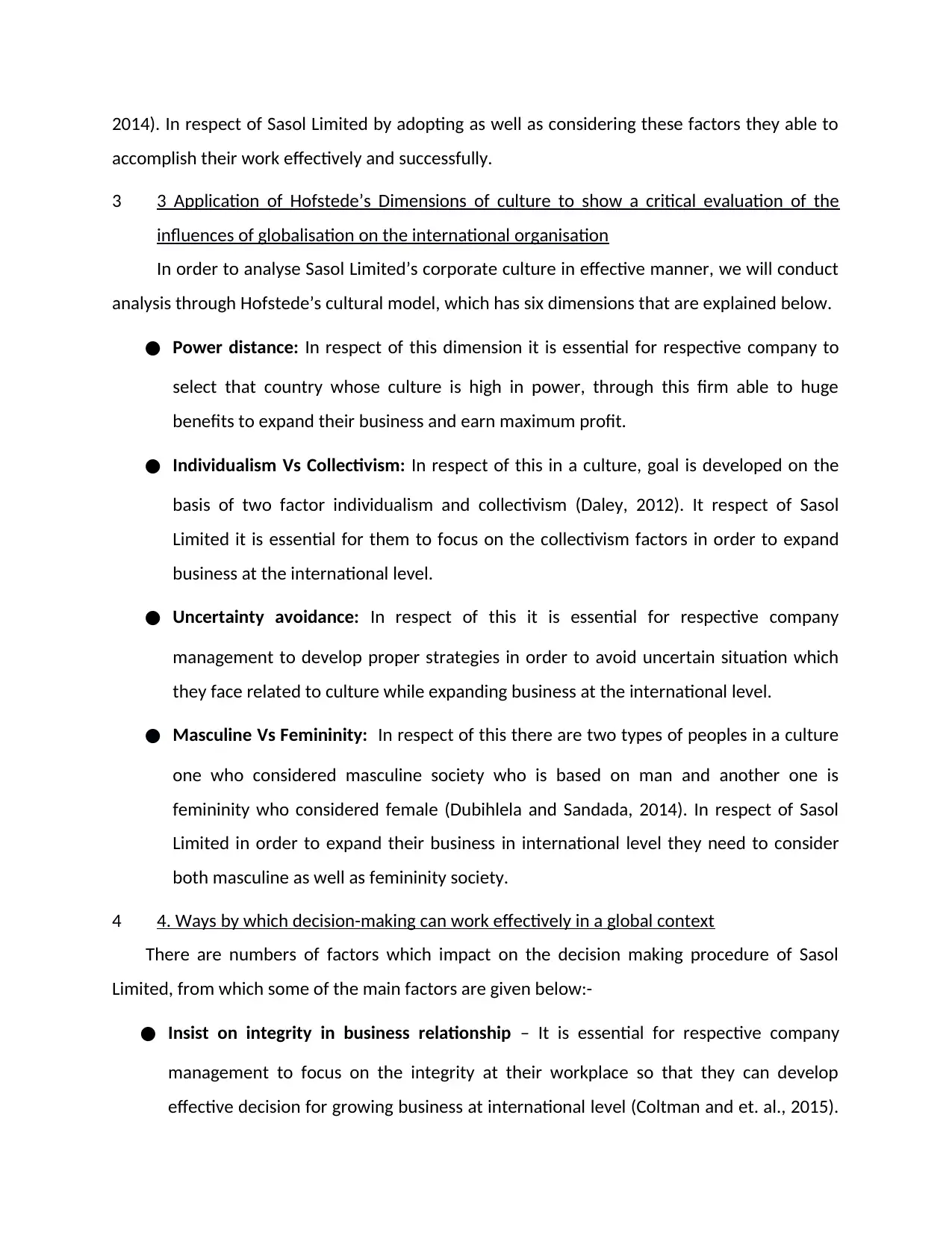
2014). In respect of Sasol Limited by adopting as well as considering these factors they able to
accomplish their work effectively and successfully.
3 3 Application of Hofstede’s Dimensions of culture to show a critical evaluation of the
influences of globalisation on the international organisation
In order to analyse Sasol Limited’s corporate culture in effective manner, we will conduct
analysis through Hofstede’s cultural model, which has six dimensions that are explained below.
● Power distance: In respect of this dimension it is essential for respective company to
select that country whose culture is high in power, through this firm able to huge
benefits to expand their business and earn maximum profit.
● Individualism Vs Collectivism: In respect of this in a culture, goal is developed on the
basis of two factor individualism and collectivism (Daley, 2012). It respect of Sasol
Limited it is essential for them to focus on the collectivism factors in order to expand
business at the international level.
● Uncertainty avoidance: In respect of this it is essential for respective company
management to develop proper strategies in order to avoid uncertain situation which
they face related to culture while expanding business at the international level.
● Masculine Vs Femininity: In respect of this there are two types of peoples in a culture
one who considered masculine society who is based on man and another one is
femininity who considered female (Dubihlela and Sandada, 2014). In respect of Sasol
Limited in order to expand their business in international level they need to consider
both masculine as well as femininity society.
4 4. Ways by which decision-making can work effectively in a global context
There are numbers of factors which impact on the decision making procedure of Sasol
Limited, from which some of the main factors are given below:-
● Insist on integrity in business relationship – It is essential for respective company
management to focus on the integrity at their workplace so that they can develop
effective decision for growing business at international level (Coltman and et. al., 2015).
accomplish their work effectively and successfully.
3 3 Application of Hofstede’s Dimensions of culture to show a critical evaluation of the
influences of globalisation on the international organisation
In order to analyse Sasol Limited’s corporate culture in effective manner, we will conduct
analysis through Hofstede’s cultural model, which has six dimensions that are explained below.
● Power distance: In respect of this dimension it is essential for respective company to
select that country whose culture is high in power, through this firm able to huge
benefits to expand their business and earn maximum profit.
● Individualism Vs Collectivism: In respect of this in a culture, goal is developed on the
basis of two factor individualism and collectivism (Daley, 2012). It respect of Sasol
Limited it is essential for them to focus on the collectivism factors in order to expand
business at the international level.
● Uncertainty avoidance: In respect of this it is essential for respective company
management to develop proper strategies in order to avoid uncertain situation which
they face related to culture while expanding business at the international level.
● Masculine Vs Femininity: In respect of this there are two types of peoples in a culture
one who considered masculine society who is based on man and another one is
femininity who considered female (Dubihlela and Sandada, 2014). In respect of Sasol
Limited in order to expand their business in international level they need to consider
both masculine as well as femininity society.
4 4. Ways by which decision-making can work effectively in a global context
There are numbers of factors which impact on the decision making procedure of Sasol
Limited, from which some of the main factors are given below:-
● Insist on integrity in business relationship – It is essential for respective company
management to focus on the integrity at their workplace so that they can develop
effective decision for growing business at international level (Coltman and et. al., 2015).
⊘ This is a preview!⊘
Do you want full access?
Subscribe today to unlock all pages.

Trusted by 1+ million students worldwide
1 out of 16
Related Documents
Your All-in-One AI-Powered Toolkit for Academic Success.
+13062052269
info@desklib.com
Available 24*7 on WhatsApp / Email
![[object Object]](/_next/static/media/star-bottom.7253800d.svg)
Unlock your academic potential
Copyright © 2020–2026 A2Z Services. All Rights Reserved. Developed and managed by ZUCOL.


